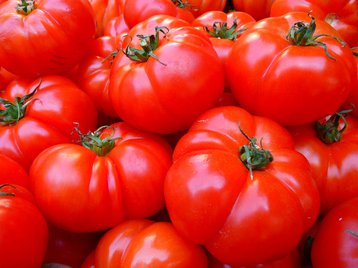Right now, tomatoes are being rationed in British supermarkets - with Tesco and Lidl limiting customers to three packs per person.
UK consumers have gotten used to having salad vegetables readily available all year round, and suddenly supermarkets are running out - with customers seeing empty shelves or limited supplies. And that's causing arguments.
No one can agree why tomatoes (and cucumbers and other salad items) are so scarce. Some say it's the weather in Spain, some say fuel prices, and many blame Brexit - since Britain left the EU, importing goods from the continent has become a massive logistical problem (and it is worth noting that other European nations have not seen similar levels of shortages).
I see an opportunity here. Next winter, data centers could prevent a similar shortage.
Supply chains
The fundamental problem is having a reliable supply of food when multiple things can change. In other words, our food security depends on planning, that can handle changes in the supply chain.
Britain consumes some 400,000 tonnes of tomatoes a year. Only 17 percent of that is normally grown in this country, with the biggest part of the rest coming from Spain.
The balance of our tomato consumption has been moving to imports, during this time. Britain grew half as many tomatoes (68,000 tonnes) in 2021 as it did in 1990 (132,000 tonnes).
The last year has seen unpredictable weather conditions across Europe, and an energy crisis, with the costs of fuel going up. So British growers had a cold winter, and couldn't afford to heat their greenhouses, so production went down.
Retailers expected to make up the difference with imports - but found that import prices were high. Unusually cold weather in Spain had hit that crop, and this year importers faced increased red tape because Brexit rules have kicked in, and the time and effort of getting goods into Britain has increased.
Fundamentally, no one is planning for all this.
The country has been simultaneously increasing its reliance on imports, while pursuing a strategy (Brexit) that will restrict them.
At the same time, despite an obvious need to maintain production at home, vegetable growers have reported they didn't get enough support from government schemes to help industry with energy costs.
Greenhouse effect
What has all this got to do with data centers? It was researcher Petter Terenias who pointed out the potential connection to me.
Data centers are increasingly trying to make use of their waste heat - but are actually finding it hard to do so. Most of them don't have a convenient local district heating system to vent their waste heat into, and in any case, air-cooled data centers don't produce useful forms of heat, like hot water.
With that in mind, some data centers have been reaching out to farmers - and maybe a few more could do so.
EcoDataCenter in Sweden has a partnership with circular economy firm Wa3rm to use EcoDataCenter's waste heat in greenhouses. Block heating in the Netherlands has a facility colocated with a greenhouse that grows tomatoes. In Japan, the White Data Center experimented with using waste heat to grow tomatoes but eventually settled on eels and mushrooms.
The idea is that warmth from the facility can extend the growing season or enable plants to grow better.
Several other organizations are investigating locating data centers and farms together. Digital Crossroad in Indiana has a farming research greenhouse.
Our fundamental problem is a lack of planning, but Terenias thinks that when we finally get around to making plans, some of these might involve data centers.
Of course, this is not an immediate solution. It takes a long while to build a data center, establish heat-sharing, and actually grow plants. It also means the data center location has to be one where a greenhouse could actually operate. As Terenius put it in an article based on his forthcoming PhD on data center heat reuse: "Successful implementation of technology must be situated in a geographical context, that is, where the material meets the social".
Or, more succinctly: "With better planning for data center waste heat reuse in the UK - and smart placement of the data centers in question - there would have been no tomato shortage (or at least less of it)."


